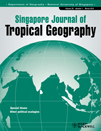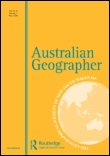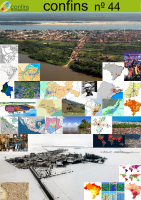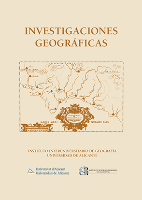
SINGAPORE JOURNAL OF TROPICAL GEOGRAPHY
Scope & Guideline
Championing Innovative Research in Tropical Geography
Introduction
Aims and Scopes
- Socio-environmental Dynamics:
Research on the interactions between human societies and their environments, including how people adapt to and modify their surroundings in tropical regions. - Migration and Mobility Studies:
Exploration of migration patterns, transnationalism, and the impacts of mobility on culture and identity, particularly in Southeast Asia. - Political Ecology and Environmental Governance:
Analysis of the political dimensions of environmental issues, including land use, resource management, and the effects of climate change. - Cultural Geography and Identity:
Studies on the cultural practices, identities, and spatial narratives of communities in tropical regions, focusing on issues of belonging and representation. - Urban Studies and Infrastructure:
Examination of urbanization processes, infrastructure development, and their socio-political implications in tropical cities.
Trending and Emerging
- Climate Change and Resilience:
A growing emphasis on climate change impacts, adaptation strategies, and resilience planning in tropical regions, reflecting global concerns over environmental sustainability. - Urbanization and Infrastructure Development:
Increasing studies on urbanization processes, infrastructural challenges, and governance in rapidly growing tropical cities, addressing the complexities of urban life. - Migration and Transnationalism:
An emergent focus on the experiences of migrants, diaspora communities, and the socio-political implications of mobility, particularly in Southeast Asia. - Postcolonial and Decolonial Perspectives:
A rising interest in postcolonial theory and decolonial approaches in geography, exploring historical legacies and current power dynamics. - Cultural and Creative Geographies:
Emerging studies on the role of culture and creativity in shaping geographical identities and spaces, reflecting a broader interest in the intersection of art and geography.
Declining or Waning
- Historical Geography:
Research focusing on historical contexts and their geographical implications seems to be less prominent, possibly overshadowed by contemporary studies on urban dynamics and socio-environmental issues. - Traditional Ecological Knowledge:
Although once a significant area of focus, studies emphasizing traditional ecological practices and indigenous knowledge systems are appearing less frequently, indicating a possible shift towards more modern and globalized perspectives. - Geopolitical Analysis:
While geopolitical themes have been present, there appears to be a decline in in-depth geopolitical analyses compared to the increasing focus on local and community-based studies.
Similar Journals

Biblio 3W-Barcelona
Empowering researchers in the realm of librarianship.Biblio 3W-Barcelona is a prominent academic journal published by the Universitat de Barcelona, Servei Publicacions, focusing on the dynamic field of library and information science. Established to foster scholarly communication, this journal provides a platform for researchers, professionals, and students dedicated to the advancement of bibliographic studies and library management. Despite lacking a current impact factor, Biblio 3W-Barcelona is recognized for its commitment to high-quality research and its contribution to the field, making it a valuable resource for those engaged in understanding the complexities of information dissemination in modern society. The journal features original research articles, critical reviews, and case studies that invite varied perspectives within the realm of librarianship. Readers can access its comprehensive body of work freely, enriching their knowledge and fostering practical applications in library science. For submission guidelines and further information, visit their website.

AUSTRALIAN GEOGRAPHER
Unveiling Australia's Geographic NarrativesAUSTRALIAN GEOGRAPHER, published by Routledge Journals, Taylor & Francis Ltd, is a leading scholarly journal that captures the dynamic and multifaceted field of geography. With an ISSN of 0004-9182 and an E-ISSN of 1465-3311, this peer-reviewed journal has a long-standing tradition, dating back to its origins between 1928 and 1929, and is essential for those engaged in cutting-edge research in Earth-Surface Processes and Geography, Planning and Development. Recognized for its academic rigor, the journal holds a prestigious Q1 ranking in both Earth-Surface Processes and Geography categories as of 2023. Furthermore, its Scopus rankings underscore its influence, placing it in the top 30% of its field. Although it does not currently offer Open Access, AUSTRALIAN GEOGRAPHER remains a critical platform for presenting significant geographic research and fostering academic dialogue, making it indispensable for researchers, professionals, and students eager to contribute to the evolving landscape of geographic scholarship.

Geoadria
Bridging Disciplines for a Sustainable FutureGeoadria, an esteemed Open Access journal published by the University of Zadar in Croatia, has been at the forefront of disseminating valuable research since its inception in 1996. With a keen focus on atmospheric science, demography, earth-surface processes, and geography, this journal serves as a crucial platform for researchers and professionals aiming to explore the intricate relationships between these fields. Although it currently holds a Q4 quartile ranking in various categories, such as Atmospheric Science and Geography, its commitment to promoting innovative scholarly dialogue ensures its relevance and utility within the academic community. Geoadria is indexed in Scopus, with rankings that reflect its ongoing contribution to the social sciences and earth sciences, notably garnering attention in niche areas. With a dedication to open access since 1996, the journal stands as a testament to the University of Zadar's commitment to enhancing global knowledge. Researchers, professionals, and students interested in geography, demography, and environmental sciences will find Geoadria a vital resource for the latest empirical studies and theoretical discussions.

GEOJOURNAL
Illuminating Innovative Solutions in GeographyGEOJOURNAL, published by SPRINGER, is a distinguished academic journal that occupies a pivotal role in the fields of geography, planning, and development. With a robust ISSN of 0343-2521 and an E-ISSN of 1572-9893, it has been a cornerstone of scholarly communication since its inception in 1977. Operating from the Netherlands, GEOJOURNAL offers insightful research articles that delve into the dynamics of spatial analysis, environmental management, urban studies, and regional development, thus catering to a diverse readership of researchers, professionals, and students alike. The journal boasts an impressive Scopus ranking of #176 out of 821 in its category, positioning it in the top 22% percentile while maintaining a Q2 quartile ranking in Geography, Planning, and Development as of 2023. With access options available, GEOJOURNAL remains a vital platform for disseminating cutting-edge research and fostering academic collaboration, indispensable for those engaging with contemporary geographic challenges and innovative solutions. Engage with GEOJOURNAL to enrich your understanding and contribute to critical discussions in this ever-evolving field.

Entorno Geografico
Connecting Researchers, Professionals, and Students WorldwideEntorno Geográfico is a premier open-access journal published by University of Valle, dedicated to the field of geography and environmental studies. Since its inception in 2002, this journal has provided a dynamic platform for researchers, professionals, and students to disseminate innovative findings and engage in critical discussions regarding geographical phenomena and environmental challenges. With an ISSN of 1692-0074 and an E-ISSN of 2382-3518, it is recognized for its commitment to high-quality peer-reviewed content that reflects cutting-edge research trends within the discipline. The journal aims to enhance understanding of socio-environmental processes and contribute to the formulation of sustainable solutions to pressing geographical issues. By fostering an open-access model, Entorno Geográfico ensures that valuable knowledge is widely accessible, encouraging collaboration and advancing education in the field. Located in Cali, Colombia, the journal reflects a strong regional focus while embracing a global perspective, making it an essential resource for the international geography community.

Letters in Spatial and Resource Sciences
Connecting Research and Practice in Resource AllocationLetters in Spatial and Resource Sciences, published by Springer Heidelberg, is a prestigious journal dedicated to the interdisciplinary exploration of spatial and resource-related issues within the fields of demography, economics, geography, planning, and urban studies. Since its inception in 2008, this journal has provided a platform for cutting-edge research, facilitating the exchange of innovative ideas and methodologies that address contemporary challenges in spatial dynamics and resource allocation. With an impact factor reflecting its robust standing in academic circles (notably ranking Q2 in Demography and Geography, and Q3 in Economics and Econometrics as of 2023), it serves as an essential resource for scholars and practitioners alike. The journal is committed to fostering open dialogue and advancing the understanding of spatial phenomena, making it a vital asset for anyone engaged in these dynamic areas of study. Targeting a diverse audience, from researchers to industry professionals, it aims to enhance scholarly communication and promote evidence-based solutions to spatial and resource dilemmas.

Confins-Revue Franco-Bresilienne de Geographie-Revista Franco-Brasileira de Geografia
Bridging Continents, Expanding HorizonsConfins-Revue Franco-Bresilienne de Geographie-Revista Franco-Brasileira de Geografia is a distinguished academic journal dedicated to the dynamic field of geography, bridging insights between French and Brazilian perspectives. Published by REVUES ORG, this journal has been embracing an Open Access model since 2007, ensuring that research is disseminated widely and freely accessible for all scholars, practitioners, and students. With its robust commitment to promoting interdisciplinary dialogue, Confins supports the exploration of various geographical themes ranging from urban studies to environmental challenges, contributing significantly to the global understanding of geographical phenomena. The journal aims to foster collaboration and intellectual exchange, highlighting critical contemporary issues while adhering to rigorous academic standards. Based in Paris, this publication stands as a pivotal resource for advancing geographical knowledge and a must-read for those engaged in research and professional practice in the field.

Investigaciones Geograficas-Spain
Exploring the intersections of geography, planning, and development.Investigaciones Geográficas-Spain is an esteemed academic journal published by the Universidad de Alicante, dedicated to advancing the fields of geography, planning, and development as well as earth and planetary sciences. With its commitment to open access since 1983, the journal ensures that research is readily available to a global audience, facilitating knowledge dissemination and collaborative discourse. As reflected in its 2023 Scopus rankings, it holds a commendable position within the Q3 category in both Earth and Planetary Sciences and Geography, Planning and Development, making it a noteworthy resource for scholars and practitioners in these disciplines. The journal's scope encompasses diverse geographical research, aiming to address pressing environmental and societal challenges through empirical studies and theoretical advancements. By contributing to the knowledge reservoir from Spain and beyond, Investigaciones Geográficas-Spain serves as a vital platform for researchers, professionals, and students seeking to enrich their understanding of geographical phenomena.

GEOgraphia-UFF
Empowering Research Through Open AccessGEOgraphia-UFF is an esteemed open-access journal dedicated to the dissemination of innovative research and scholarship in the field of geography. Published by Universidade Federal Fluminense since 2014, this journal serves as a vital platform for researchers, professionals, and students to explore a diverse array of geographical topics, from human-environment interactions to urban studies and spatial analysis. With a pronounced commitment to accessibility and knowledge sharing, GEOgraphia-UFF promotes a collaborative academic environment, fostering dialogue and critical engagement among scholars worldwide. Located in the picturesque region of Rio de Janeiro, Brazil, the journal aims to bridge local insights with global geographical challenges, ensuring relevance and impact in the ever-evolving discourse of our discipline. This journal is an indispensable resource for anyone looking to stay at the forefront of geographical research.

Hungarian Geographical Bulletin
Connecting researchers with cutting-edge insights in geography.Hungarian Geographical Bulletin, with ISSN 2064-5031 and E-ISSN 2064-5147, is a premier open-access journal published by the CSFK GEOGRAPHICAL INSTITUTE that has been an influential resource since 2009, dedicated to advancing the fields of geography, cultural studies, and agronomy. Located in Budapest, Hungary, this journal aims to disseminate high-quality research and engage a diverse audience of researchers, professionals, and students. The journal's reputation is underscored by its impressive category quartiles in 2023, ranking Q2 in Agronomy and Crop Science, Q1 in Cultural Studies, and Q2 across several other areas, including Geography and Earth and Planetary Sciences. With a Scopus ranking that places it in the top percentiles in multiple fields, the Hungarian Geographical Bulletin serves as an essential platform for innovative ideas and discussions that drive geographical scholarship and practice forward, specifically during its converged years from 2014 to 2024. Whether you are a seasoned researcher or an enthusiastic student, this journal presents a wealth of knowledge that is easily accessible due to its open-access format.